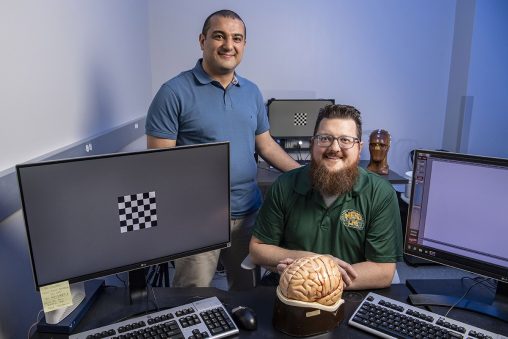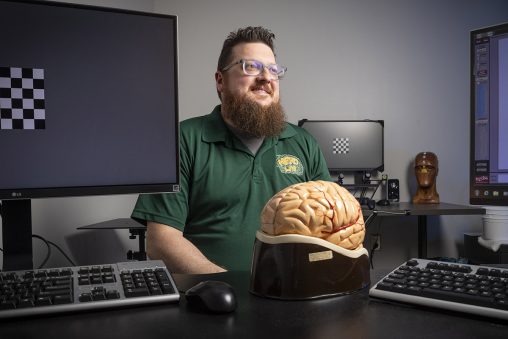
Sherif Elbasiouny, the Wright State University and Premier Health endowed chair in neurodegenerative diseases research, and Justin Estepp, a Ph.D. in engineering student at Wright State, are collaborating on a novel cognitive performance research project for the Air Force Research Laboratory. (Photos by Erin Pence)
When the Air Force Research Laboratory (AFRL) sought to launch a novel longitudinal research project collecting thousands of hours of data, the organization knew it needed to partner with a university to make it happen.
AFRL did not need to look far when it collaborated with Wright State University and Sherif Elbasiouny, Ph.D., the Wright State University and Premier Health endowed chair in neurodegenerative diseases research.
The project, which began in 2016, is a collaboration between AFRL and researchers in Wright State’s Neuro Engineering, Rehabilitation and Degeneration (N.E.R.D.) Laboratory, which is overseen by Elbasiouny, who is also director of neuroengineering education and research, professor of neuroscience, cell biology and physiology, and professor of biomedical, industrial and human factors engineering.
The researchers are studying signals from the brain, sometimes called brain waves, to help improve the cognitive performance of Air Force personnel.
Elbasiouny said the experimental design of the study benefits from being conducted at Wright State. He described his collaboration with AFRL as a win-win for Wright State, its students and Wright-Patterson Air Force Base.
“For the study to be rigorous, we need a large sample of people to participate,” he said. “This project specifically benefits a great deal from being at the university campus because we’re capable of getting such a large number of people to participate. Our location is a great asset for that to happen, to facilitate this collaboration.”
Justin Estepp, who graduated with a bachelor’s degree and a master’s degree in biomedical engineering from Wright State and is now pursuing a Ph.D. in engineering, said everything the Air Force does is dependent upon the people responsible for executing the Air Force mission. Understanding how the brain works can help researchers help Airmen perform better.
“Doing everything that the Air Force can do to make sure we’re giving them the tools to work to the best of their ability is really, really important,” Estepp said. “I think neuroscience is a part of that.”
“That’s their goal, to get technologies into the hands of Airmen and Guardians that can help them to do their jobs better to the best of their ability,” said Estepp, who is also a principal investigator in the Air Force Research Laboratory’s 711th Human Performance Wing.
During the study, Estepp and his colleagues used electroencephalography, or EEG, to monitor the brain activity of research participants while they performed computerized tasks or tried to solve puzzles.
The researchers used machine-learning algorithms, or decoders, to look for specific information in the EEG data, including whether participants performed well or poorly on a task. They also examined why a person’s brain signals differ when they perform the same task at different times.
“We’re interested in signals or data from the brain that can tell us something about someone’s workload or fatigue or attention,” Estepp said. “Then we use that to make assessments about cognitive performance in real time because it’s hard to do that. So, we’re trying to do that by going directly to the brain.”

Justin Estepp said his experiences as a biomedical engineering student at Wright State reinforced his decision to pursue a career in research at the Air Force Research Laboratory.
Because decoders are less reliable when they interpret data over time, they can be less reliable when studying a person’s long-term cognitive performance.
To better understand why this happens, the researchers set up a unique longitudinal study in which they monitored subjects’ cognitive performances once a week for up to 16 weeks. Previous human-subject studies typically last for four to six weeks because they are time- and labor-intensive.
The researchers set up three labs in Wright State’s Neuroscience Engineering Collaboration Building, enabling them to collect data for a year and a half.
“At our peak, we were doing about 100 hours of human-subjects data collection a week, which is a lot,” Estepp said.
That volume of research activity is unheard of, he added.
“You won’t find that in other labs and other projects,” Estepp said. “In human-subject research, that’s a really novel aspect.”
The project has involved scientists from Wright State and the Air Force and around 20 undergraduate and graduate students at Wright State. Some of those students have gone on to work at AFRL after graduating.
“AFRL has been able to hire and support Wright State students through this project,” he said. “I think that’s really impactful.”
Estepp was born and raised in Fairborn. After graduating from Fairborn High School, he was selected for the first class of the Wright Scholar Research Assistant Program, a summer internship program for local high school students at the Air Force Research Laboratory.
He said his experiences as a biomedical engineering student at Wright State reinforced his decision to pursue a career in research.
“I had a couple of a-ha moments along the way that really assured me that what I was doing was relevant,” he recalled. “We would cover material or techniques in lecture or in lab here on campus, in my classes, and I could take them over to the Air Force base and use them in the work that I was doing there.”
Estepp said it was rewarding to apply something he was studying as a Wright State student in his work at AFRL.
“Any time as a student that I was learning something here and I could take and immediately apply to what I was doing in the lab, that was really gratifying,” he said.
Estepp described Elbasiouny as the right partner for the research project and is hopeful that AFRL’s collaboration with Wright State will continue for years to come.
“We’ve been so successful with what we’ve been doing,” Estepp said. “We want to keep it going and keep those successes going, to continue to build on the really novel work that we’ve done here.”
“I am really enjoying the collaboration with Justin,” Elbasiouny said. “Our collaboration exemplifies the partnership between Wright State University and AFRL.”
DISTRIBUTION STATEMENT A. Approved for public release: distribution is unlimited. AFRL Cleared 06/05/24; AFRL-2024-3022.

 Wright State student-athletes make a lasting impact on local family, more to come
Wright State student-athletes make a lasting impact on local family, more to come  Wright State names Rajneesh Suri dean of Raj Soin College of Business
Wright State names Rajneesh Suri dean of Raj Soin College of Business  ‘Only in New York,’ born at Wright State
‘Only in New York,’ born at Wright State  Wright State president, Horizon League leaders welcome new commissioner
Wright State president, Horizon League leaders welcome new commissioner  Wright State celebrates homecoming with week-long block party
Wright State celebrates homecoming with week-long block party 